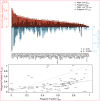Genomic and drug target evaluation of 90 cardiovascular proteins in 30,931 individuals
- PMID: 33067605
- PMCID: PMC7611474
- DOI: 10.1038/s42255-020-00287-2
Genomic and drug target evaluation of 90 cardiovascular proteins in 30,931 individuals
Abstract
Circulating proteins are vital in human health and disease and are frequently used as biomarkers for clinical decision-making or as targets for pharmacological intervention. Here, we map and replicate protein quantitative trait loci (pQTL) for 90 cardiovascular proteins in over 30,000 individuals, resulting in 451 pQTLs for 85 proteins. For each protein, we further perform pathway mapping to obtain trans-pQTL gene and regulatory designations. We substantiate these regulatory findings with orthogonal evidence for trans-pQTLs using mouse knockdown experiments (ABCA1 and TRIB1) and clinical trial results (chemokine receptors CCR2 and CCR5), with consistent regulation. Finally, we evaluate known drug targets, and suggest new target candidates or repositioning opportunities using Mendelian randomization. This identifies 11 proteins with causal evidence of involvement in human disease that have not previously been targeted, including EGF, IL-16, PAPPA, SPON1, F3, ADM, CASP-8, CHI3L1, CXCL16, GDF15 and MMP-12. Taken together, these findings demonstrate the utility of large-scale mapping of the genetics of the proteome and provide a resource for future precision studies of circulating proteins in human health.
Conflict of interest statement
The other authors declare no competing interests
Figures








References
Publication types
MeSH terms
Substances
Grants and funding
- MR/L003120/1/MRC_/Medical Research Council/United Kingdom
- CZB/4/710/CSO_/Chief Scientist Office/United Kingdom
- MR/S004068/2/MRC_/Medical Research Council/United Kingdom
- 637640/ERC_/European Research Council/International
- MC_PC_U127592696/MRC_/Medical Research Council/United Kingdom
- ARC_/Arthritis Research UK/United Kingdom
- CZB/4/276/CSO_/Chief Scientist Office/United Kingdom
- WT_/Wellcome Trust/United Kingdom
- 204979/Z/16/Z/WT_/Wellcome Trust/United Kingdom
- RG/13/13/30194/BHF_/British Heart Foundation/United Kingdom
- SP/09/002/BHF_/British Heart Foundation/United Kingdom
- MR/S004068/1/MRC_/Medical Research Council/United Kingdom
- MR/S003746/1/MRC_/Medical Research Council/United Kingdom
- R01 HL139731/HL/NHLBI NIH HHS/United States
- BTRU-2014-10024/DH_/Department of Health/United Kingdom
- FS/18/23/33512/BHF_/British Heart Foundation/United Kingdom
- MC_UU_00011/1/MRC_/Medical Research Council/United Kingdom
- 335395/ERC_/European Research Council/International
- RG/18/13/33946/BHF_/British Heart Foundation/United Kingdom
- MC_UU_00007/10/MRC_/Medical Research Council/United Kingdom
LinkOut - more resources
Full Text Sources
Other Literature Sources
Research Materials
Miscellaneous

